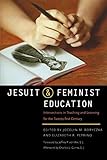Jesuit and Feminist Education : Intersections in Teaching and Learning for the Twenty-first Century / ed. by Elizabeth A. Petrino, Jocelyn M. Boryczka.
Material type: TextPublisher: New York, NY : Fordham University Press, [2022]Copyright date: ©2012Description: 1 online resource (380 p.) : 20 Illustrations, black and whiteContent type:
TextPublisher: New York, NY : Fordham University Press, [2022]Copyright date: ©2012Description: 1 online resource (380 p.) : 20 Illustrations, black and whiteContent type: - 9780823233328
- 9780823291939
- online - DeGruyter
| Item type | Current library | Call number | URL | Status | Notes | Barcode | |
|---|---|---|---|---|---|---|---|
 eBook
eBook
|
Biblioteca "Angelicum" Pont. Univ. S.Tommaso d'Aquino Nuvola online | online - DeGruyter (Browse shelf(Opens below)) | Online access | Not for loan (Accesso limitato) | Accesso per gli utenti autorizzati / Access for authorized users | (dgr)9780823291939 |
Frontmatter -- Contents -- Foreword -- Introduction: Educating for Transformation—Jesuit and Feminist Approaches in the Classroom and Beyond -- Part I: Mapping the ‘‘Herstory’’ of Jesuit Education -- 1 ‘‘Do as I Do, Not as I Say’’ -- 2 Mary, the Hidden Catalyst -- 3 Early Jesuit Pedagogy and the Subordination of Women -- Part II: Intersection I -- 4 ‘‘The Personal Is Political’’ -- 5 Paideia and the Political Process -- 6 Feminist Pedagogy, the Ignatian Paradigm, and Service-Learning -- Part III: Intersection II -- 7 The Intersection of Race, Class, and Gender in Jesuit and Feminist Education -- 8 Teaching for Social Justice in the Engaged Classroom -- 9 Transformative Education in a Broken World -- 10 Consciousness-Raising as Discernment -- Part IV: The Fault Lines of Gender, Sex, and Sexuality -- 11 De Certeau and ‘‘Making Do’’ -- 12 Textual Deviance -- 13 Tilling the Soil -- 14 Women in Jesuit Higher Education -- Afterword -- Appendix. Decree 14: Jesuits and the Situation of Women in Church and Civil Society -- Notes -- Bibliography -- Contributors -- Index
restricted access online access with authorization star
http://purl.org/coar/access_right/c_16ec
Given its long tradition of authentic dialogue with other religious and philosophical perspectives, Jesuit education is uniquely suited to address the range of opportunities and challenges teachers and students face in the twenty-first century. At first glance, Jesuit and feminist ways of understanding the world appear to be antagonistic approaches to teaching and learning. But much can be gained by focusing on how feminism, in dialogue with Jesuit education, can form, inform, and transform each other, our institutions, and the people in them. Both traditions are committed to educating the whole person by integrating reason and emotion. Both also argue for connecting theory and practice and applying knowledge in context. As unabashedly value-driven educational approaches, both openly commit to social justice and an end to oppression in its many forms. With strong humanistic roots, Jesuit and feminist education alike promote the liberal arts as critical to developing engaged citizens of the world. This book explores how the principles and practices of Ignatian pedagogy overlap and intersect with contemporary feminist theory in order to gain deeper insight into the complexities of today’s multicultural educational contexts. Drawing on intersectionality, a method of inquiry that locates individual and collective standpoints in relation to social, political, and economic structures, the volume highlights points of convergence and divergence between Ignatian pedagogy, a five-hundred year old humanistic tradition, and more recent feminist theory in order to explore how educators might find strikingly similar methods that advocate common goals—including engaging with issues such as race, gender, diversity, and social justice. By reflecting on these shared perspectives and inherent differences from both practical and theoretical approaches, the contributors of this volume initiate a dynamic dialogue about Jesuit and feminist education that will enliven and impact our campuses for years to come.
Mode of access: Internet via World Wide Web.
In English.
Description based on online resource; title from PDF title page (publisher's Web site, viewed 03. Jan 2023)


